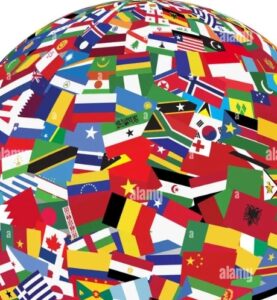5 Countries That Were Never Colonised by Other Nations
5 Countries That Were Never Colonised by Other Nations

During centuries of imperial conquest, countless nations around the globe were subjected to foreign rule—shaping their political, cultural, and economic trajectories in profound ways. Yet, a select few managed to defy the colonial wave, preserving their sovereignty in an age dominated by empires.
Through strategic diplomacy, geographical advantages, and military prowess, these countries resisted external domination and remain remarkable examples of national resilience and independence.
Here are five countries that successfully avoided colonisation—and how they managed to stay free.
—
1. Ethiopia
Ethiopia is one of Africa’s most iconic stories of resistance to colonialism. While European powers carved up the continent during the Scramble for Africa, Ethiopia stood its ground.
In 1896, under the leadership of Emperor Menelik II, Ethiopian forces decisively defeated the Italians at the Battle of Adwa. This victory not only protected Ethiopia’s sovereignty but also became a powerful symbol of African pride and resistance. Although Italy briefly occupied Ethiopia in the 1930s during Mussolini’s reign, it is widely viewed as a military occupation—not true colonisation. Ethiopia’s independence was largely maintained through unity, strategic alliances, and capable leadership.
—
2. Japan
Unlike many of its Asian neighbors, Japan never fell under colonial rule—thanks to forward-thinking reforms and rapid modernisation. The Meiji Restoration of 1868 transformed the nation into a strong industrial and military force.
By embracing Western technologies and political systems while maintaining a firm grip on national sovereignty, Japan was able to protect itself from colonisation. In fact, it reversed roles by becoming a colonial power itself, establishing influence over parts of East Asia. Japan’s refusal to remain stagnant in a rapidly modernising world ensured its independence and elevated its global standing.
—
3. Thailand
Thailand, formerly known as Siam, is the only Southeast Asian country that was never colonised by a European power. Surrounded by British-controlled Burma and French Indochina, Thailand’s survival is credited to its astute and adaptive diplomacy.
Kings Rama IV and Rama V negotiated skillfully with both the British and French, striking treaties that maintained Thailand’s sovereignty while avoiding direct conflict. They also initiated selective reforms to modernise the country, making it less vulnerable to foreign interference. Thailand’s ability to act as a buffer state between rival empires preserved its independence in a region otherwise dominated by colonial rule.
—
4. Nepal
Nepal retained its autonomy through a combination of natural defenses and military strength. Situated in the Himalayan mountains, its rugged terrain made foreign invasion challenging. The country’s legendary Gurkha warriors further discouraged would-be colonisers with their reputation for fearlessness and combat skill.
Although the British Empire expanded aggressively across the Indian subcontinent, Nepal maintained its independence. The Treaty of Sugauli in 1816, following a brief war with the British, resulted in some territorial concessions but upheld Nepal’s sovereignty. The nation’s cautious diplomacy and strategic isolation helped it remain free from foreign domination.
—
5. Bhutan
Tucked away in the eastern Himalayas, Bhutan managed to remain independent by embracing isolation and exercising diplomatic caution. Its steep, mountainous geography offered a natural shield against invasions, and its leaders carefully limited foreign interaction.
Bhutan engaged in measured relations with British India, securing peaceful coexistence without surrendering autonomy. The kingdom’s long-standing policy of self-isolation allowed it to maintain a distinct cultural identity and avoid the fate of many neighboring regions that fell under colonial control.
—
Final Thoughts
These five countries stand out in world history not just for avoiding colonisation, but for doing so through strategic foresight, resilience, and in some cases, sheer geographical fortune. In a time when global empires were at their peak, these nations held firmly to their independence—leaving a legacy
of pride and sovereignty that continues to inspire today.
TRENDING SONGS
 RCCG PASTOR ANGRY OVER CALLING Him“MR” INSTEAD OF “DR,” DECLARES CURSE ONLINE
RCCG PASTOR ANGRY OVER CALLING Him“MR” INSTEAD OF “DR,” DECLARES CURSE ONLINE
 NPMA Appeals to Nigerian Government for Compensation After Lagos Market Fire
NPMA Appeals to Nigerian Government for Compensation After Lagos Market Fire
 Rest Every Four Hours, FRSC Issues Safety Guide for Fasting Motorists
Rest Every Four Hours, FRSC Issues Safety Guide for Fasting Motorists
 NNPC Boss Ojulari Bags UK Energy Institute Fellowship
NNPC Boss Ojulari Bags UK Energy Institute Fellowship
 Shock in Anambra: Bride Disappears Moments Before Wedding
Shock in Anambra: Bride Disappears Moments Before Wedding
 Nigerian Woman Returns ₦330 Million Accidentally Credited to Her Account
Nigerian Woman Returns ₦330 Million Accidentally Credited to Her Account
 APC Don Reach Morocco?’ VeryDarkMan Reacts to Seyi Tinubu Poster
APC Don Reach Morocco?’ VeryDarkMan Reacts to Seyi Tinubu Poster
 Bride Breaks Down in Tears as Wedding Meals Were Kept Secretly While Guests Go Home Hungry
Bride Breaks Down in Tears as Wedding Meals Were Kept Secretly While Guests Go Home Hungry
 Odogwu by Day, Robber by Night: How Marriage Joy Turned Into Tragedy
Odogwu by Day, Robber by Night: How Marriage Joy Turned Into Tragedy
 Nigerian Officials Allegedly Pocket N4–6B Weekly Through Smuggling Cartels at Seme–Badagry Border
Nigerian Officials Allegedly Pocket N4–6B Weekly Through Smuggling Cartels at Seme–Badagry Border
Share this post with your friends on ![]()













